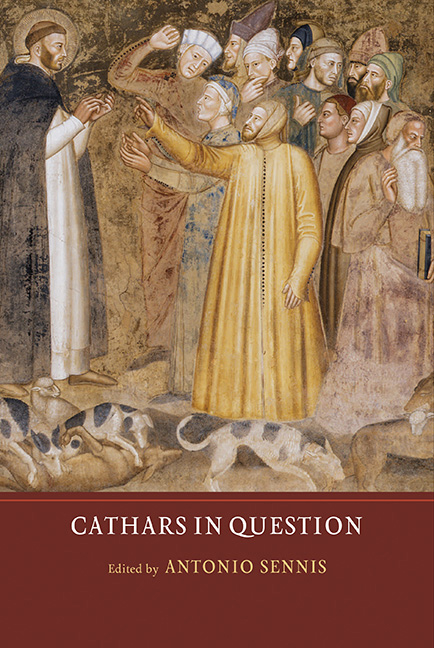Book contents
- Frontmatter
- Contents
- Acknowledgments
- 1 Questions about the Cathars
- 2 The Paradigm of Catharism; or, the Historians’ Illusion
- 3 The Cathar Middle Ages as a Methodological and Historiographical Problem
- 4 The Heretical Dissidence of the ‘Good Men’ in the Albigeois (1276–1329): Localism and Resistance to Roman Clericalism
- 5 The Heretici of Languedoc: Local Holy Men and Women or Organized Religious Group? New Evidence from Inquisitorial, Notarial and Historiographical Sources
- 6 Cathar Links with the Balkans and Byzantium
- 7 Pseudepigraphic and Parabiblical Narratives in Medieval Eastern Christian Dualism, and their Implications for the Study of Catharism
- 8 The Cathars from Non-Catholic Sources
- 9 Converted-Turned-Inquisitors and the Image of the Adversary: Ranier Sacconi Explains Cathars
- 10 The Textbook Heretic: Moneta of Cremona's Cathars
- 11 ‘Lupi rapaces in ovium vestimentis’: Heretics and Heresy in Papal Correspondence
- 12 Looking for the ‘Good Men’ in the Languedoc: An Alternative to ‘Cathars’?
- 13 Principles at Stake: The Debate of April 2013 in Retrospect
- 14 Goodbye to Catharism?
- Index
- Miscellaneous Endmatter
10 - The Textbook Heretic: Moneta of Cremona's Cathars
Published online by Cambridge University Press: 31 March 2017
- Frontmatter
- Contents
- Acknowledgments
- 1 Questions about the Cathars
- 2 The Paradigm of Catharism; or, the Historians’ Illusion
- 3 The Cathar Middle Ages as a Methodological and Historiographical Problem
- 4 The Heretical Dissidence of the ‘Good Men’ in the Albigeois (1276–1329): Localism and Resistance to Roman Clericalism
- 5 The Heretici of Languedoc: Local Holy Men and Women or Organized Religious Group? New Evidence from Inquisitorial, Notarial and Historiographical Sources
- 6 Cathar Links with the Balkans and Byzantium
- 7 Pseudepigraphic and Parabiblical Narratives in Medieval Eastern Christian Dualism, and their Implications for the Study of Catharism
- 8 The Cathars from Non-Catholic Sources
- 9 Converted-Turned-Inquisitors and the Image of the Adversary: Ranier Sacconi Explains Cathars
- 10 The Textbook Heretic: Moneta of Cremona's Cathars
- 11 ‘Lupi rapaces in ovium vestimentis’: Heretics and Heresy in Papal Correspondence
- 12 Looking for the ‘Good Men’ in the Languedoc: An Alternative to ‘Cathars’?
- 13 Principles at Stake: The Debate of April 2013 in Retrospect
- 14 Goodbye to Catharism?
- Index
- Miscellaneous Endmatter
Summary
Moneta of Cremona's Summa adversus Catharos et Valdenses has been at the centre of the conception of Catharism for a long time. Widely used by contemporaries, both the text and its author retained a consistent place in the Dominican (and later also Jesuit) memory of anti-heretical writing from the time of its composition until it was edited by Thomas Ricchini at the Dominican convent in Rome in 1743. Ricchini's edition was used in early nineteenth-century histories of the Catholic Church and of Catholic writers, but it was placed back at the centre of the history of heterodoxy with the advent of modern scholarship on heresy that began, in earnest, with Charles Schmidt in the middle of the nineteenth century.
Schmidt, really the first modern commentator to look at the Cathars as a subject in their own right, was a leading figure in a revival of interest in medieval heresy, and his Histoire et doctrine de la secte des cathares ou albigeois set the standard for much of the work that followed. Another work on Catharism was being written at the same time, by Hahn, and Schmidt acknowledged this work, but he did not perceive it as being exactly parallel to his own project. He saw himself as addressing a topic that had been little covered, looking at heresy not as part of the history of the Church so much as part of the wider western intellectual tradition. That meant that his interest in reading the anti-heretical texts of the high medieval period was primarily in excavating what visible remains of heterodox thought could be discerned, rather than in the commentators and authors who wrote about it. His approach to his topic was therefore one of self-conscious and deliberate reconstruction of a sect, a process that he described as rebuilding an edifice from scattered debris. These materials, his debris, were collected largely from French archives, and to a lesser extent from German and Swiss archives, but Schmidt was frank about his inability or disinclination to use Italian material: at the time he was writing, the material was too scattered, and access to it too problematic. Tellingly, he described the task of reconstruction as an exercise in reconnecting events and information which would otherwise look unrelated, in order to present a coherent whole.
- Type
- Chapter
- Information
- Cathars in Question , pp. 208 - 228Publisher: Boydell & BrewerPrint publication year: 2016



